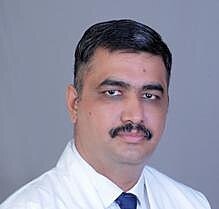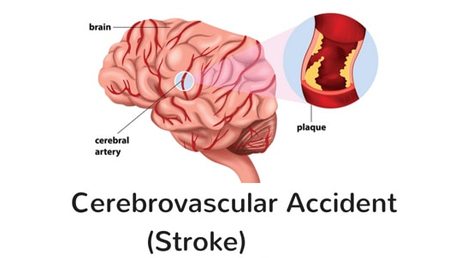
M.B.B.S., L.T.M.M.C., G.H., D.N.B. (Neurosurgery)
Since August 2015, I have been serving as a Consultant Neurosurgeon and Spine Surgeon at Indraprastha Apollo Hospitals, New Delhi. In June 2022, I transitioned to Apollo Hospitals Navi Mumbai, and in June 2024, I rejoined Indraprastha Apollo Hospitals. Additionally, I hold the position of Honorary Neurosurgeon at Tirath Ram Shah Charitable Hospitals, Delhi. In the past, I have had the honor of being associated with Yatharth Super Speciality Hospitals, Chikitsa Noida Medical Center, Apollo Hospitals Noida, and Inlaks Hospitals, Mumbai.

Cerebrovascular disease refers to a group of conditions that affect blood flow and the blood vessels in the brain. Problems with blood flow may occur from blood vessels narrowing (stenosis), clot formation (thrombosis), artery blockage (embolism), or blood vessel rupture (hemorrhage). Lack of sufficient blood flow (also referred to as ischemia) affects brain tissue and may cause a stroke.
Cerebrovascular stenosis, which involves plaque buildup in the arteries that supply blood to the brain. This causes them to harden and narrow and increases the risk of clots.
Cerebral aneurysm, which occurs when the wall of an artery that supplies blood to the brain becomes weak and begins to bulge, increasing the risk of hemorrhaging.
Cerebrovascular malformations, which are conditions present at birth affecting the blood vessels in the brain.
The signs and symptoms of cerebrovascular disease depend on which blood vessels in the brain are affected and how much blood flow is impacted.
Signs and symptoms of cerebrovascular stenosis do not usually become apparent until a trans ischemic attack or stroke occurs. Warning signs of a trans ischemic attack or stroke may include the sudden onset of some or all the following symptoms:
Cerebrovascular malformations have no known causes. Cerebrovascular stenosis and aneurysms may be caused by:
In addition to the causes of cerebrovascular disease that can be controlled, risk factors include: Family history:Those who have a family history of cerebrovascular disease and related conditions are at greater risk. Gender: Women are more likely to develop a brain aneurysm and cerebrovascular hemorrhaging. Ethnicity:African-Americans are more likely to develop cerebrovascular disease due to a greater risk of high blood pressure. Prevention
M.B.B.S., L.T.M.M.C., G.H., D.N.B (Neurosurgery)
My Neurosurgical Training in Chennai (2003-2008) involved working in the prestigious Neurosurgical unit at Voluntary Health Services Hospital. I had the honor of starting with and being the last student of Prof. B. Ramamurthi, the first Neurosurgeon of India, who established this institute after superannuation from Madras Medical College. Thereafter, I worked under Dr. Chandrashekhar Deopujari and Dr. Uday Andar at Bai Jerbai Wadia Hospital for Children, Mumbai (2009 – 2011).
Dr. Amit Kapoor
Indraprastha Apollo Hospital
Tirath Ram Shah Hospital
Happy Healing Polyclinic
Apollo Hospital, Noida
dramitkapoor@yahoo.com
+91-8448449837
©2022 Dr. Amit Kapoor, All Right Reserved.
